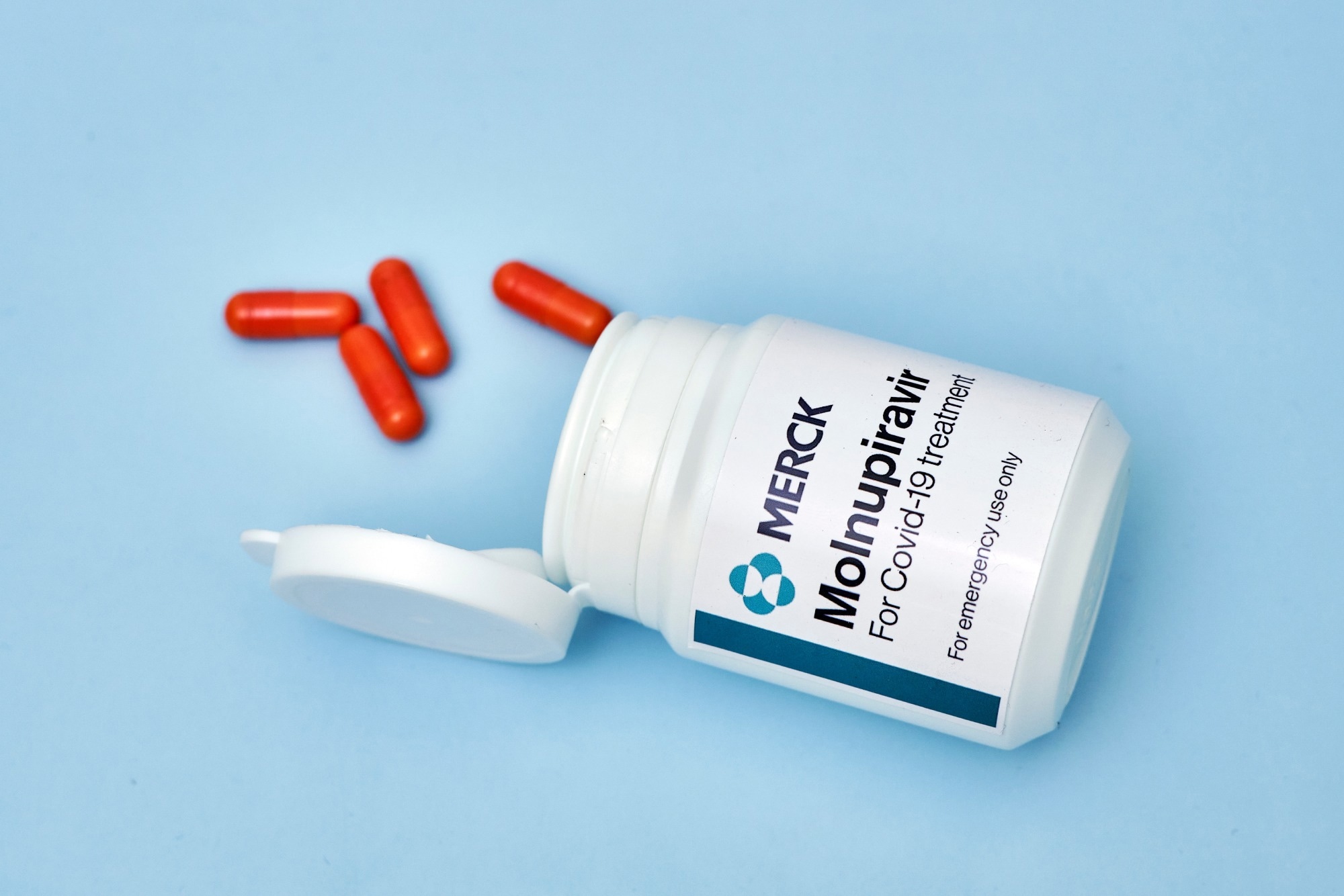A recent study published in The Lancet reported the real-world efficacy of oral antiviral therapies nirmatrelvir plus ritonavir, and molnupiravir on the severe acute respiratory syndrome coronavirus 2 (SARS-CoV-2) Omicron (B.1.1.529) variant, based on an observational study among coronavirus disease 2019 (COVID-19) patients in Hong Kong.

Background
Most evidence for the efficacy of oral antivirals such as nirmatrelvir plus ritonavir, and molnupiravir comes from clinical trials conducted before SARS-CoV Omicron (B.1.1.529) became the predominantly circulating variant. Clinical trials in over 20 countries have shown that the early administration of these two oral antiviral therapies to individuals exhibiting mild to moderate COVID-19 symptoms reduces the risk of hospitalization and mortality by 30–89%.
A large number of the clinical trials for nirmatrelvir plus ritonavir and molnupiravir were conducted on unvaccinated individuals who were not hospitalized but were at risk of mild or moderate COVID-19 symptoms progressing to more severe outcomes. Furthermore, the studies were conducted largely during the circulation of the SARS-CoV-2 delta (B.1.617.2) variant. Therefore, the real-world efficacy of these therapies needs to be investigated based on the emergent SARS-CoV-2 variants and the vaccination status of individuals.
About the study
In the present study, the researchers used the Hong Kong Hospital Authority database to gather information on confirmed SARS-CoV-2 cases and the associated demographic characteristics, diagnoses, prescribed treatment, COVID-19 vaccination status, laboratory tests, hospitalization status, and registered deaths. The study was conducted between January and June 2022, which was the period of dominance of the SARS-CoV-2 Omicron variant.
Individuals aged 18 years or above with positive reverse transcription polymerase chain reaction (RT-PCR) tests confirming SARS-CoV-2 infection were included in the study. The patients were administered molnupiravir or nirmatrelvir plus ritonavir within five days of the onset of mild to moderate symptoms.
Risk factors such as diabetes, obesity, other chronic illnesses, age (older than 60 years), and incomplete vaccination were considered as criteria for antiviral administration. The study excluded individuals being treated with drugs that could have contraindications to nirmatrelvir plus ritonavir. Patients with severe renal or liver impairments were also excluded to avoid confounding the results.
The primary analysis was based on a retrospective cohort study, while the internal validation sensitivity analysis was based on a case-control study design. The participants were divided into two groups based on the prescription for molnupiravir or nirmatrelvir plus ritonavir. The date of positive SARS-CoV-2 or onset of symptoms, whichever occurred earlier, was considered the index date. The treatment cohort was matched with a control cohort comprising SARS-CoV-2 positive individuals who were not prescribed molnupiravir or nirmatrelvir plus ritonavir.
The retrospective cohort study and the case-control study measured three outcomes — all-cause mortality, hospitalization due to COVID-19, and a composite outcome consisting of the requirement of intensive care unit (ICU) or invasive mechanical ventilation (IMV) or in-hospital mortality. The cohort study also included an additional outcome of individual in-hospital outcomes consisting of mortality, initiation of IMV, or ICU requirement.
Results
The results indicated that the early administration of oral antivirals molnupiravir or nirmatrelvir plus ritonavir significantly reduced the mortality risk compared to not being treated with either of the two antiviral therapies. Additionally, nirmatrelvir plus ritonavir also reduced hospitalization risk due to COVID-19.
Early administration of the two oral antiviral therapies was associated with lower mortality and hospitalization risk in patients aged 60 years and above. The use of molnupiravir resulted in reduced initiation of IMV. Updated clinical trials showed that nirmatrelvir plus ritonavir decreased mortality and hospitalization risks by 51% in unvaccinated individuals or fully vaccinated COVID-19 patients with at least one risk factor.
The study found that molnupiravir users were older and more likely to be incompletely vaccinated than nirmatrelvir plus ritonavir users. The authors believe this result was best explained by molnupiravir’s first-mover advantage, and nirmatrelvir plus ritonavir not being as widely prescribed to the elderly due to its interactions with various other drugs. However, later guidelines promote nirmatrelvir plus ritonavir over molnupiravir as it significantly reduces the risk of hospitalization, even in patients who are not fully vaccinated.
Conclusions
To conclude, the observational study conducted in Hong Kong during the predominance of the SARS-CoV-2 Omicron BA.2.2 sublineage reported that the early administration of oral antivirals nirmatrelvir plus ritonavir or molnupiravir significantly reduced the severity of the disease and the mortality risks. Nirmatrelvir plus ritonavir also lowered hospitalization risk.
The authors noted that given the potential genotoxicity and mutational risks of molnupiravir, and the concerns over rapidly mutating SARS-CoV-2 developing antiviral resistance, further clinical studies and increased pharmacovigilance for monitoring the safety of oral antivirals are necessary.
Journal reference:
- Wong, C. K. H., Au, I. C. H., Lau, K. T. K., Lau, E. H. Y., Cowling, B. J., & Leung, G. M. (2022). Real-world effectiveness of molnupiravir and nirmatrelvir plus ritonavir against mortality, hospitalisation, and in-hospital outcomes among community-dwelling, ambulatory patients with confirmed SARS-CoV-2 infection during the omicron wave in Hong Kong: an observational study. The Lancet. doi: https://doi.org/10.1016/s0140-6736(22)01586-0 https://www.sciencedirect.com/science/article/pii/S0140673622015860









 Add Category
Add Category

.jpg)